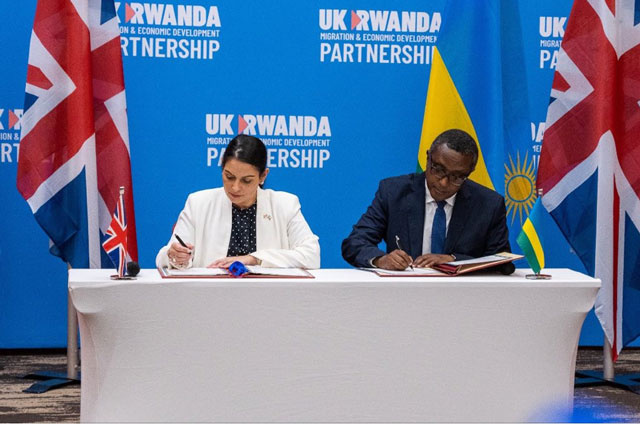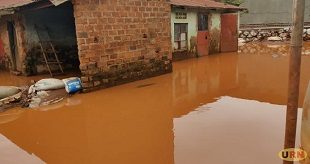
London, UK | THE INDEPENDENT | The decision by the government of the United Kingdom to relocate people seeking asylum there to Rwanda is a probable solution to several issues the county is facing, an expert has said.
But the announcement by the UK Prime Minister earlier in the week drew many questions as to why the government would ‘send away’ people that are hoping for better livelihoods, to a third world African country.
The UN High Commissioner for Refugees roundly condemned the deal between the two governments, expressing worry about the safeguards or their absence, put in place to ensure the safety and welfare of the migrants.
And Kigali made it clear if there happens to be among the group, any migrant from neighbouring countries like Uganda, they will not be allowed in.
The move by the UK is a reminder of some of the reasons why it decided to exit the European Union, which included the disagreement of the open policy on migrants.
UK Home Secretary, Priti Patel admitted that the UK Migration System was collapsing due to the increasing number of illegal immigrants, and that her country will now only allow in those that come in through legal routes and those fleeing persecution.
For the illegal immigrants, like those smuggled across the Mediterranean Sea from Africa, those crossing to the UK clutched on trucks through countries in Europe, or those stowaways clinging on aircraft flying to the country will not be allowed.
Dr Vincent Biruta, Rwanda’s Minister of Foreign Affairs, told a joint news conference with the UK minister, that the criteria used will block migrants from the neighbouring countries, to avoid the influx of criminal elements.
Rwanda has in recent times accused Uganda, Burundi and the Democratic Republic of Congo of harbouring elements opposed to the Paul Kagame regime, while the countries also implicate it as host to crime suspects.
The countries, including Tanzania are also hosts of hundreds of thousands of Rwandan refugees.
The country has however, recently been supporting efforts to ensure improved relations with all the four countries.
Prof. Robert Ojambo, Head of the Department of History and Political Science and Kyambogo University says under normal circumstances, the most-in-need people to be hosted by Rwanda should be those from neighbouring countries, so that in case of need to return home, it would be easier.
“Under third country migrant arrangements, the host counties seek to ensure that the migrants are relocated to countries as near as possible to their home countries.
This makes it easier for the authorities to process their return to their homes when the conditions are better,” he says.
According to the media reports in Europe, most of the migrants to be affected are from West Africa and the north and Horn of African countries, especially those that are smuggled across the Mediterranean Sea to their final destinations.
These are mainly people seeking better economic opportunities in the west. Prof Ojambo says that Rwanda is therefore in a dilemma because some of the migrants might be a threat to the safety of the country.
“You might see some of the relocated migrants arriving in Rwanda in handcuffs,” he added. “And if such a person happens to be from a neighbouring country, you don’t want to host them. It might not even be a good signal to your neighbours if you host a person suspected to be fleeing prosecution.”
But the Political scientists also says such arrangements where migrants are relocated from their desired destination host, is also used to discourage others intending to follow the same route.
“If those who intend to go to the UK using the same means, learn that those who did it before have been taken to another country under such circumstances, they might have to think twice.”
This was repeated by Tom Pursglove, the UK minister for justice and tackling illegal migration, in an interview with a YouTube channel, Good Morning Britain.
He said that while the new policy was “in line” with the UK’s legal obligations, relocation of immigrants is one of the ways of stopping the illegal influx of people.
While announcing the offer worth almost 160 million dollars to Rwanda on Thursday, Prime Minister Boris Johnson hailed Rwanda as one of the safest countries in the world, and with the capacity to “resettle tens of thousands of people in the years ahead.”
The tiny country in the centre of Africa is the second-most densely populated country on the continent behind Mauritius, with 525 people per square kilometer, compared to the continent’s average of 45.
“Rwanda and the UK have been trying to improve their relations in the last few years, and this deal is partly aimed at cementing that progress,” says Prof Ojambo.
The UNHCR was quick to issue a statement to condemn the deal, urging the UK to refrain from exporting the asylum seekers and refugees without proper safeguards.
“UNHCR remains firmly opposed to arrangements that seek to transfer refugees and asylum seekers to third countries in the absence of sufficient safeguards and standards. Such arrangements simply shift asylum responsibilities, evade international obligations, and are contrary to the letter and spirit of the Refugee Convention,” said UNHCR’s Assistant High Commissioner for Protection, Gillian Triggs.
“People fleeing war, conflict and persecution deserve compassion and empathy. They should not be traded like commodities and transferred abroad for processing.”
****
URN
 The Independent Uganda: You get the Truth we Pay the Price
The Independent Uganda: You get the Truth we Pay the Price



